Summer Reading Project, BookLikes Satellite
Never stop reading. (Content originally posted at Blogger.)
The Tea Planter's Wife, by Dinah Jeffries

Gwen was not at all prepared for life on her new husband’s tea plantation in the highlands of Ceylon (now Sri Lanka). Her loving veteran husband, on his home turf, is taciturn, secretive, and far too willing to grant the wishes of his sister and former lover. The Tea Planter’s Wife, by Dinah Jeffries, is the story of a young woman who has to learn to navigate the complicated family history she has landed in the middle of and find a measure of happiness for herself...
Read the rest of my review at A Bookish Type. I received a free copy of this book from NetGalley and Edelweiss for review consideration.
The Conjoined, by Jen Sookfong Lee
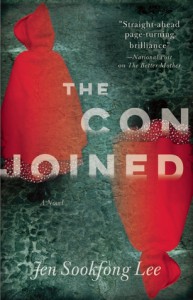
Coming to terms with a parent’s death is difficult enough, but Jon Sookfong Lee threw a hell of a curveball at the protagonist of The Conjoined. While Jessica Campbell and her father are clearing out years of accumulated food, clothes, and the rest of Jessica’s mother’s possessions, they stumble across something that sends Jessica into a tailspin. Until they discover two bodies buried deep in freezers in the basement, everyone believed that Donna was the next best thing to a saint. Donna cooked the healthiest of foods and took in troubled foster children all Jessica’s life. So who is in the freezer and how did they get there?
Read the rest of my review at A Bookish Type. I received a free copy of this book from NetGalley for review consideration.
The Upright Heart, by Julia Ain-Krupa

I think authors write about the Holocaust and readers keep reading about the Holocaust because there is no coming to terms with a crime so massive, so damaging. Every novel is a fresh perspective on an event that will always shape humanity. That said, Julia Ain-Krupa’s The Upright Heart is one of the most unusual perspectives I’ve yet seen in Holocaust fiction. Instead of replicating history, this novel is a ghost story, with the dead place as much or more of a role than the living...
Read the rest of my review at A Bookish Type. I received a free copy of this book from Edelweiss for review consideration.
The Secrets of Wishtide, by Kate Saunders
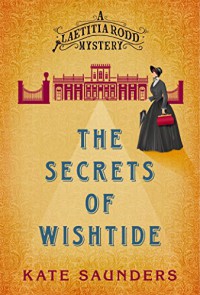
Five years after her archdeacon husband passed away, leaving her with a very small annuity, Laetitia Rodd makes ends meet (and staving off boredom) by investigating mysteries for her lawyer brother. It is a curious career for a widow, but Laetitia has a knack for getting people to reveal their secrets and for winkling out criminal motives. The Secrets of Wishtide, by Kate Saunders, introduces us to a new series featuring the irrepressible widow and detective...
Read the rest of my review at A Bookish Type. I received a free copy of this book from NetGalley for review consideration.
Everfair, by Nisi Shawl
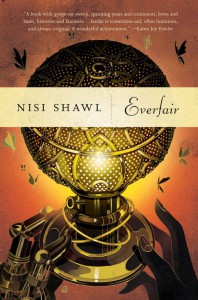
Eddie Izzard explains colonization in such a way that it highlights the absurdity of people just showing up on a coast and claiming it in spite of the fact that people already lived in that area. As I read Nisi Shawl’s Everfair, I was reminded of Izzard remarking on British colonists’ “cunning use of flags.” In the opening chapters of this alternate history, the same plot of land in what is, in our reality, southern Congo is claimed by three different groups: King Mwenda and his tribe, the Belgians, and the Everfair colonists. Mwenda’s people have been in that part of the world for as long as they can remember but, in the world’s eyes, the land belongs to the Belgians, who can sell it off to the Everfair colonists through the cunning use of paper. By telling us the story of the people who live on this contested land, Shawl raises the matter of flags to a high-stakes human drama...
Read the rest of my review at A Bookish Type. I received a free copy of this book from NetGalley for review consideration.
A Gentleman in Moscow, by Amor Towles
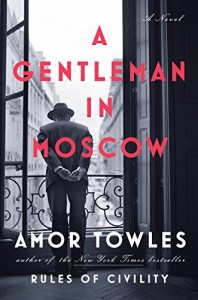
Several times in Amor Towles’s A Gentleman in Moscow, Count Alexander Rostov claims or is declared by other characters to be the luckiest man in the Soviet Union. Given that Rostov lives through the most turbulent and deadly years of the Soviet regime, being under house arrest in the best hotel in Moscow is not the worst fate for the former aristocrat. Rostov escapes a death sentence for a popular, pro-Revolution poem he wrote years before. But the tribunal can’t just let a count go. So, on 21 June, 1922, Rostov is sentenced to life under house arrest at the Metropol Hotel. If he leaves, he will be arrested and executed. A Gentleman in Moscow takes us through the next thirty years of Rostov’s life at the Metropol...
Read the rest of my review at A Bookish Type. I received a free copy of this book from NetGalley for review consideration.
 3
3
The Underground Railroad, by Colson Whitehead

I read dark books. I know my tastes are not for everyone, and I am capable of recommending fun, lighthearted books to readers who request them. But I like to read gritty books, books about harrowing experiences, and especially books about the crimes of the past. I like these books not because I enjoy reading about other people’s misery; I gravitate to these books because they help keep alive in my memory events that should never be forgotten. The Underground Railroad, by Colson Whitehead, is a book that reminds us of the horrors of American slavery, a centuries’ long crime against humanity with a legacy that still haunts my country...
Read the rest of my review at A Bookish Type. I received a free copy of this book from NetGalley for review consideration.
 2
2
Who Will Catch Us as We Fall, by Iman Verjee

Iman Verjee’s atmospheric Who Will Catch Us as We Fall travels back and forth through the lives of two Kenyans. Leena is the privileged daughter of Indian Kenyans. Michael is the son of a house maid and the grandson of a farmer. We see them as children, as college students, and as young adults and, though them, we see the deep racial and social divides that run through Kenya...
Read the rest of my review at A Bookish Type. I received a free copy of this book from Edelweiss for review consideration.
A Time of Torment, by John Connolly

Charlie Parker’s quest to rid the world of villains regular law enforcement can’t capture continues in John Connolly’s A Time of Torment. The book opens with a scene that shows us Parker and his allies, assassin Louis and thief Angel, capturing a kidnapper, murderer, and blackmailer and turning him over to the FBI. This scene serves as a reminder of what bigger game that Parker is playing now that he’s returned from the dead, but it’s not part of the main action in the book. Rather, this book is about Parker, with help from his allies, takes down a small, sinister commune in West Virginia that firmly believes itself to be above the law...
Read the rest of my review at A Bookish Type. I received a free copy of this book from NetGalley for review consideration.
Curioddity, by Paul Jenkins

Wil Morgan lives a boring, miserable life. His landlady lets cats swarm around her house. His bathroom sink constantly rattles. He’s behind on all his rents. He’s failing at being a private detective and the clock in the building next to his office is slowly driving him insane. At least he no longer blows things up, which makes his father happy. But, on the morning that Paul Jenkins’s Curioddity opens, Wil takes a job that will set his life back on the weird, adventurous path it was always supposed to be on...
Read the rest of my review at A Bookish Type. I received a free copy of this book from NetGalley for review consideration.
 1
1
The Tusk that Did the Damage, by Tania James

Though brief, Tania James’s The Tusk that Did the Damage is powerfully affecting. I read it in two sittings because I couldn’t get enough of the characters, the story, and the profound questions the novel asks. The novel begins with the voice of Gravedigger, a notorious elephant in southern India. As he tells his story, we also hear from Manu, the brother of an elephant poacher, and Emma, a documentary filmmaker. Through these three narrators, I explored the conflicts between animals and humans, conservationists and poachers, ethical people and the opportunists. The fact that there are no easy answers in this book help make The Tusk that Did the Damage one of the most brilliant books I’ve read lately...
Read the rest of my review at A Bookish Type.
 1
1
The Hundred Secret Senses, by Amy Tan

It’s been so long since I read Amy Tan’s vThe Hundred Secret Senses that all I could remember about it was that a) I really liked it, b) there was reincarnation, and c) hundred-year-old duck eggs somehow played a role in the plot. I needed a good book to read today, since the last two books I read were kind of duds. The Hundred Secret Senses delivered; it was even better than I remembered. In this novel, Tan once again explores cultural and generational clashes between Chinese American and Chinese relatives. This is not another Joy Luck Club, however, as the plot asks us to take a chance on the idea of reincarnation and promises kept across lifetimes...
Read the rest of my review at A Bookish Type.
The Saint Louisans, by Steven Clark

Before I read Steven Clark’s The Saint Louisans, most of what I knew about the city of St. Louis comes from playing The Oregon Trail and learning about Lewis and Clark back in elementary school. As it tells the story of a hospice nurse whose life is turning upside down, The Saint Louisans relates details about the city’s lost history and architecture. More than anything else, I think, this book is a lament for history that was destroyed, built over, and destroyed once more...
Read the rest of my review at A Bookish Type. I received a free copy of this book from NetGalley for review consideration.
Secrecy, by Rupert Thomson

e synopsis for Rupert Thomson’s Secrecy piqued my interest, but the execution did not work for me. The novel centers on Gaetano Zummo. Zummo is a wax sculptor who has just accepted the patronage of the Grand Duke of Florence at the end of the seventeenth century. All he wants is to pursue his work making memento mori dioramas (the best way I can describe it) at the beginning of the novel. Almost immediately, he falls in love with an apothecary who turns out to have an explosive secret. His involvement with the apothecary and his patronage inspire a virulent hatred by a vindictive priest.
I finished Secrecy because I enjoyed reading about Florence in the 1690s. The setting was amazing. Unfortunately, every character except Zummo is sketchy and one-dimensional. Stufa, Zummo’s nemesis for most of the book, is a stock villain and the little bit of backstory did nothing to explain the lengths he went to to destroy Zummo’s happiness. The ending was also deeply unsatisfying.
 1
1
Suite Française, by Irène Némirovsky
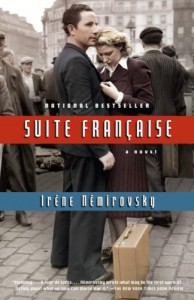
I had previously thought that John Kennedy Toole’s A Confederacy of Dunces had the saddest publication history of any novel I’d ever read. Irène Némirovsky’s incomplete Suite Française, however, has an even more heartbreaking history. Némirovsky planned a five part novel about the French experience of World War II. The first two parts of Suite Française are based directly on the months after France was invaded by Germany; it felt as if the novel was written in real time. The novel was never finished because Némirovsky was arrested by the Nazis and deported to Auschwitz, where she died in 1942. Her daughter, Denise, found, edited, and published the fragments of Suite Française more than 60 years after Némirovsky’s murder...
Read the rest of my review at A Bookish Type.
The Spy Who Came in from the Cold, by John le Carré

The Cold War was a murky conflict, so murky that it’s hard to tell what one is fighting for or what strategies are beyond the pale. London and Moscow are both convinced that they know what’s right and necessary. The people on the ground, however, have no time for ideology. People like Alec Leamas are doing their best to keep their agents and informers alive. When everything goes wrong at the beginning of John le Carré’s The Spy Who Came in From the Cold, Leamas’s long career gets even more complicated and he has to dance to his master’s awful tune one more time...
Read the rest of my review at A Bookish Type.



 1
1